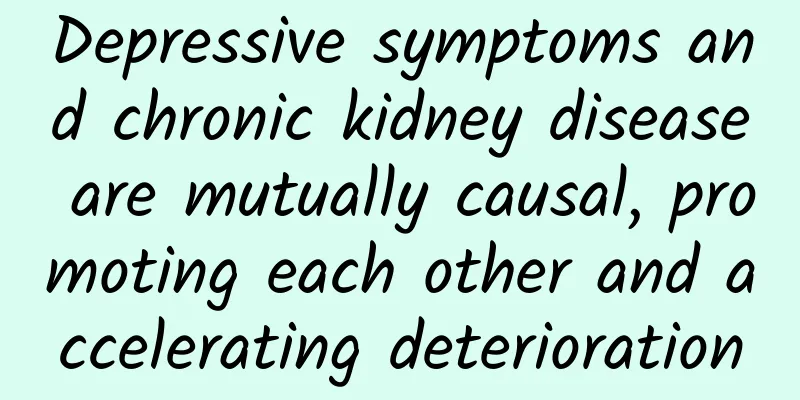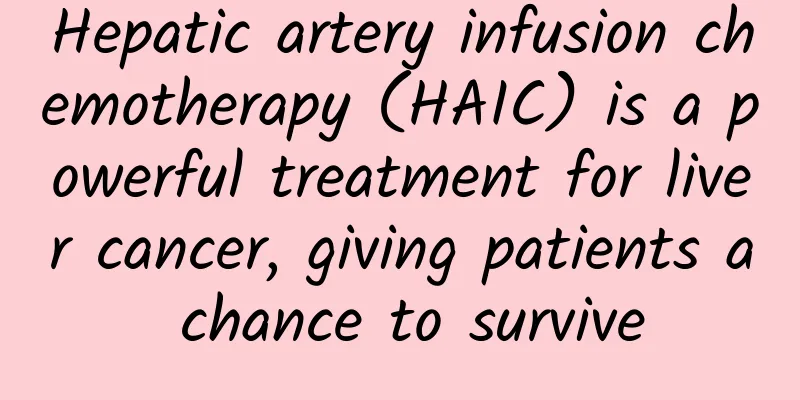What to do with advanced lung cancer? All the main treatment methods are covered!

|
Are you confused and afraid of advanced lung cancer? Faced with such a disease, many people feel confused and helpless. However, please believe that the progress of medicine will provide us with many treatments and methods to better cope with this challenge. Today, we will reveal the secrets about advanced lung cancer and its treatment methods one by one to help you understand this disease more comprehensively and better face it. What is advanced lung cancer and what is its prognosis? Advanced lung cancer, as the name suggests, means that lung cancer has developed to a more serious stage. At this stage, the tumor may have spread to other parts of the body, such as lymph nodes, brain, bones, etc. The prognosis of advanced lung cancer is usually poor, with a relatively short median survival time and a low overall five-year survival rate. However, this does not mean that advanced lung cancer is untreatable. By choosing appropriate treatments, patients may still be able to prolong their survival and improve their quality of life. What are the common treatments for advanced lung cancer? There are many treatment options for advanced lung cancer, including but not limited to the following: 1) Radiotherapy and chemotherapy are commonly used methods. Radiotherapy kills cancer cells through high-energy rays or particle beams, while chemotherapy uses chemical drugs to inhibit the growth and division of cancer cells. These two methods are usually used in combination to achieve better treatment effects. Radiotherapy and chemotherapy can effectively shrink tumors and relieve symptoms, but they may also bring some side effects, such as nausea, vomiting, fatigue, etc. Therefore, during the treatment process, patients need to pay close attention to their physical condition and communicate with their doctors in a timely manner. 2) Targeted therapy is a treatment method that has received much attention in recent years. Targeted therapy targets specific genes or proteins in lung cancer cells and prevents the growth and spread of cancer cells by inhibiting the function of these genes or proteins. Compared with chemotherapy and radiotherapy, targeted therapy is more precise and has relatively fewer side effects. However, targeted therapy is not suitable for all lung cancer patients. It requires the selection of appropriate drugs based on the patient's specific situation and genetic test results. 3) Immunotherapy is also a major breakthrough in the treatment of advanced lung cancer. Immunotherapy activates the patient's own immune system to attack cancer cells, thereby controlling the disease. For patients with negative driver genes, immunotherapy combined with chemotherapy may be a better choice. The emergence of immunotherapy also provides new hope for patients who have poor results with traditional treatments. Of course, in addition to the three main treatment methods mentioned above, there are some other methods, such as surgical treatment, traditional Chinese medicine treatment, etc. These methods may provide treatment assistance to patients in certain specific cases, but they are not suitable for all patients with advanced lung cancer. Therefore, when choosing treatment methods, patients need to fully communicate with doctors and develop personalized treatment plans based on their own conditions. How to choose targeted drugs suitable for patients with driver gene-positive advanced lung cancer? For patients with advanced lung cancer who are positive for driver genes, choosing the right targeted drug is crucial. Driver gene positivity means that there are certain specific gene mutations in lung cancer cells, which make cancer cells sensitive to specific targeted drugs. Therefore, determining the patient's driver gene status through genetic testing can provide doctors with important treatment basis. When choosing targeted drugs, doctors will also make comprehensive considerations based on the patient's genetic test results, tumor type, stage, physical condition and other factors. There are already a variety of targeted drugs targeting different driver genes on the market, such as drugs targeting genes such as EGFR, ALK, and ROS1. These genes are like "switches" or "instructions" in our bodies, and they are responsible for controlling the growth, division, and function of our body's cells. Choosing the right targeted drug can significantly improve the treatment effect and prolong the patient's survival. However, it should be noted that targeted drugs are not a panacea. During use, patients may develop problems such as drug resistance or drug side effects. Therefore, during the treatment process, patients need to pay close attention to their physical condition and conduct regular examinations and evaluations so that they can adjust the treatment plan in a timely manner. What are the personalized precision treatment options for advanced lung cancer targeting rare targets? In addition to common lung cancer targets, researchers have also discovered some rare lung cancer targets, such as BRAF and NTRK. Imagine if our body is a complex machine with many small parts working together, BRAF and NTRK are like "regulators" or "signal transmitters" among these small parts. They are responsible for transmitting important information so that the body's cells know when to grow, divide or stop. Therefore, for lung cancer patients with these rare targets, individualized precision treatment plans are particularly important. Targeted drugs have been developed for lung cancer patients with BRAF V600 mutations. These drugs can accurately attack cancer cells with BRAF mutations, thereby achieving control of the disease. For lung cancer patients with NTRK fusion-positive disease, there are also targeted drugs available. The development and application of these drugs provide new treatment opportunities for patients with lung cancer with rare targets. When formulating an individualized precision treatment plan, doctors will make comprehensive considerations based on the patient's specific situation. In addition to considering the target type, it is also necessary to consider factors such as the patient's age, gender, physical condition, and comorbidities. By comprehensively considering these factors, doctors can develop the most suitable personalized treatment plan for patients. At the same time, we also need to realize that individualized precision treatment is not a one-time process. During the treatment process, patients need to maintain close communication and cooperation with doctors, and provide timely feedback on treatment effects and physical conditions so that doctors can adjust treatment plans in a timely manner. What immunotherapy options are available for patients with advanced lung cancer who have negative driver genes? For patients with advanced lung cancer who are negative for driver genes, immunotherapy may be a good treatment option. Immunotherapy activates the patient's own immune system to attack cancer cells, thereby achieving control of the disease. There are already a variety of immunotherapy drugs available on the market for the treatment of advanced lung cancer. These drugs mainly include PD-1 inhibitors, PD-L1 inhibitors, etc. These drugs can bind to specific receptors on the surface of cancer cells, blocking the inhibitory effect of cancer cells on the immune system, thereby restoring the immune system's attack capability. However, it should be noted that immunotherapy is not suitable for all patients with advanced lung cancer who are negative for driver genes. Before using immunotherapy drugs, patients need to undergo appropriate examinations and assessments to determine whether they are suitable for immunotherapy. At the same time, when using immunotherapy drugs, patients also need to pay close attention to their physical condition and communicate with their doctors in a timely manner to deal with possible side effects and complications. How can we make more accurate choices of comprehensive treatments for advanced lung cancer? What factors should you consider to achieve better comprehensive treatment options for patients with advanced lung cancer? Genetic testing, selection of the best drugs, standardized management and other aspects are all crucial. So, as a patient or family member, how should you cooperate with the doctor to develop a personalized treatment plan that best suits the patient? Through the answers to the above questions, I believe you have a deeper understanding of advanced lung cancer and its treatment methods. When facing the challenge of lung cancer, it is very important to maintain a positive attitude, choose appropriate treatment methods, and work closely with doctors. At the same time, you should also pay attention to your lifestyle and mental health to better cope with this challenge. I hope this article can provide you with some help and inspiration, so that you can be more calm and resolute when facing advanced lung cancer. Remember, you are not fighting alone, and your doctors and medical team will fight side by side with you to face this life challenge together. Expert introduction Tang Domain Chief Physician, Doctor of Medicine, Professor, Master Supervisor Director of the Third Department of Thoracic Surgery, Liaoning Cancer Hospital Member of the Youth Council of the Chinese Anti-Cancer Association Member of the Chemotherapy Youth Committee of the Chinese Anti-Cancer Association Member of the Targeted Therapy Professional Committee of the Chinese Anti-Cancer Association Chairman of Liaoning Anti-Cancer Association Targeted Therapy Professional Committee Standing Committee Member of the Respiratory Diseases Branch of Liaoning Medical Association Vice Chairman of the Tumor Nutrition Therapy Committee of Liaoning Nutrition Society Director of Liaoning Anti-Cancer Association Member of the Chemotherapy Committee of Liaoning Anti-Cancer Association Member of the Cancer Prevention and Treatment Committee of Liaoning Provincial Association of Preventive Medicine Standing Committee Member of Breast Cancer and Immunity Branch of Liaoning Immunology Society Approval code TML0021575-54482, valid until 2025-04-18, expired information will be deemed invalid |
>>: [World Asthma Day] Taking aspirin to induce asthma is almost fatal? ! Be careful!
Recommend
The amount of menstruation is very small_The amount of menstruation is very small
A woman's period refers to the menstrual peri...
How can I stop my period?
We all know that for women, menstruation is both ...
How to make a cat's cheeks puff up? What should I do if my cat's cheeks don't puff up?
Some people like cats because their faces are rou...
Symptoms of gastric dysfunction during menopause
Everyone will experience menopause. During menopa...
My aunt just finished having sex and bleeding
Having sex right after your period is irresponsib...
Pregnant woman acid reflux water is a boy or a girl
The most important feature of a woman giving birt...
Are bilateral ovarian cysts serious?
Everyone must be familiar with the disease of ova...
How long does it take for postpartum lochia to be discharged?
Postpartum lochia is a physiological process that...
What causes vaginal itching in women?
Vaginal itching is a very common physical disease...
Hypopituitarism in women
If some patients have low pituitary function, it ...
HPV is negative for advanced cervical cancer
Nowadays, many women are prone to gynecological d...
How to store green onions in summer without them going bad? Can green onions be used in scallion oil noodles?
Green onion is one of the onion vegetables. It has...
Can pregnant women eat tangerine peel in the early stage?
In many people's minds, Poria cocos is a snac...
How to distinguish benign from malignant lesions in PET-CT scans?
In the medical field, especially in tumor diagnos...
The difference between breast fibroids and breast cysts
Women's breasts are a sensitive and fragile p...









